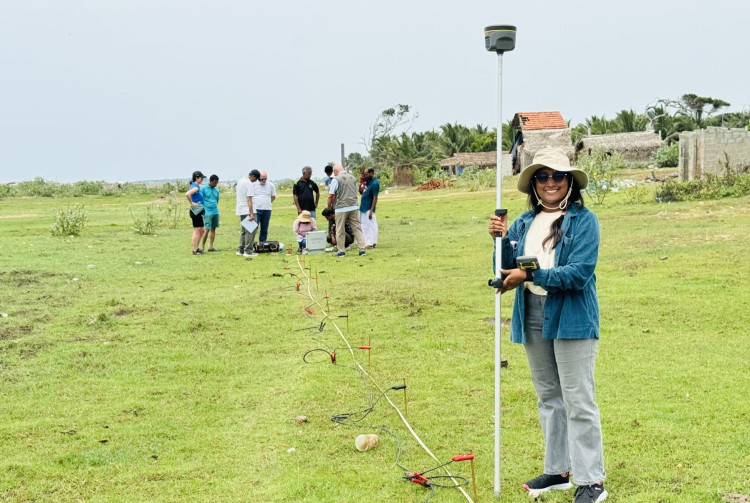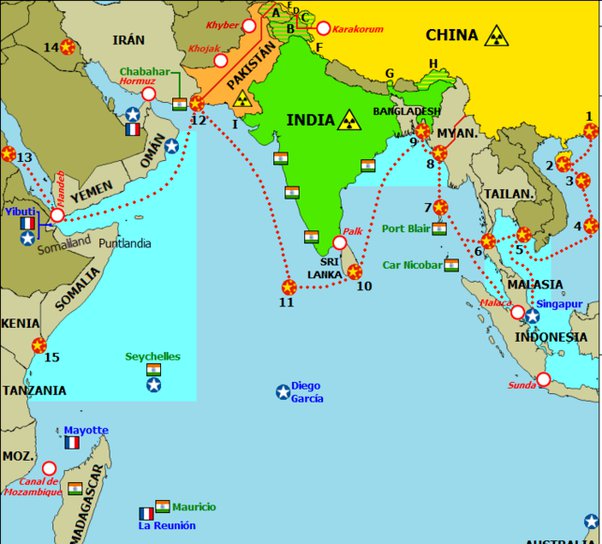Sri Lanka’s economy is at a critical tipping point, grappling with escalating geopolitical challenges and economic strain. The World Bank has highlighted growing concerns, cautioning that the island nation is still not entirely out of the woods. The recent imposition of U.S. tariffs has exacerbated the crisis, prompting a stark warning from President Anura Kumara Dissanayake. He compared the situation to “a tsunami disaster and the COVID-19 pandemic.” Describing the tariffs as “a national economic calamity,” the president called for collective national action to mitigate further consequences.
The reciprocal tariffs announced by U.S. President Donald Trump have undoubtedly dealt a severe blow to Sri Lanka’s economic aspirations. While many Sri Lankan experts perceive this as primarily an economic issue, the underlying reality is far more complex. At its core, this is a trade war that began in 2018 under the Trump administration’s reciprocal tariffs, aimed at reducing the U.S. trade deficit and addressing alleged Chinese intellectual property theft. By 2025, the second Trump administration had escalated these measures, further intensifying global economic tensions.
This conflict extends beyond Mr. Trump’s policy; it reflects a larger contest between China and the U.S., with Sri Lanka caught in the fallout. Sitting out of this geopolitical struggle is no longer an option. In this context, Sri Lanka must urgently recalibrate its economic strategy to navigate these realities.
Against this backdrop, former President Ranil Wickremesinghe has positioned himself as a pragmatic advocate for decisive measures. In an interview with Indian media, he emphasised the pressing need to finalise the Economic and Technology Cooperation Agreement (ETCA) between Sri Lanka and India by the year’s end.
ETCA: A Strategic Opportunity
ETCA offers a progressive pathway to strengthen Sri Lanka’s economic resilience. Building on the India-Sri Lanka Free Trade Agreement (ISFTA) signed in 1998; ETCA aims to deepen economic integration between the two nations. India and Sri Lanka already share a robust partnership in infrastructure, connectivity, healthcare, education, and industrial development.
In 2016, then-Prime Minister Ranil Wickremesinghe championed ETCA, highlighting its strategic benefits not just for Sri Lanka but also for India’s southern states—Karnataka, Tamil Nadu, Andhra Pradesh, Kerala, and Telangana. With a combined population of 250 million and a GDP of USD 450 billion, these states, along with Sri Lanka’s USD 80 billion economy, could form a sub-regional economic bloc exceeding USD 500 billion. However, fierce political resistance stalled its progress.
Opposition and Misconceptions
This political resistance soon turned ETCA into a flashpoint of controversy in Colombo. Opposition parties labelled it a threat to Sri Lankan sovereignty, condemning the agreement as an “attack on Sri Lanka.”
The Janatha Vimukthi Peramuna (JVP), a party then seeking greater national prominence, spearheaded public dissent. Under the leadership of Anura Kumara Dissanayake, the JVP organised a series of seminars to rally opposition, beginning with a high-profile event at Mahaweli Hall. The seminars, themed “Denounce ETCA that sacrifices our economy to India”, drew public attention to concerns over the agreement.
Addressing the audience, Dissanayake acknowledged the historical significance of India, calling it a nation with a strong human civilisation and citing the Indus Valley civilisation as a testament to its strength. Yet, his praise was tempered with sharp criticism, as he accused India of pursuing an “invasive foreign policy.”
This opposition stems from misunderstandings about Sri Lanka’s economic partnerships and India’s role. However, India’s unconditional support during Sri Lanka’s bankruptcy has underscored its cooperative foreign policy, effectively undermining much of the rhetoric against ETCA. The Indian government’s assistance to Sri Lanka has amounted to nearly $4 billion since the crisis began, providing much-needed relief to a nation struggling for “a breath of life.”
Lessons from the Crisis
The resistance to ETCA mirrors the opposition faced by Sri Lanka’s agreement with the International Monetary Fund (IMF). Critics argued that IMF policies would harm the public, yet these objections did not prevent Sri Lanka from sliding into bankruptcy. Had ETCA been finalised in 2016, it could have potentially mitigated the severity of Sri Lanka’s economic collapse.
The frequently championed rhetoric of “nonaligned,” “neutral,” and “balanced” foreign policy in Colombo failed to deliver solutions during the crisis. President Dissanayake now pragmatically admits, “Sri Lanka cannot stand up on our own; in this, the most important partner is India. It is a country with which we have historical ties.” This pragmatic realisation highlights the critical need to finalise ETCA.
The Strategic Imperative
Today, ETCA is not just an economic necessity but a strategic imperative. Despite delays caused by misconceptions and opposition, the agreement holds the potential to significantly strengthen Sri Lanka’s economic resilience.
When Prime Minister Wickremesinghe introduced the proposal, it received strong backing from the Ceylon Chamber of Commerce (CCC). A cornerstone of Sri Lanka’s economy for over 176 years, the CCC has consistently advocated for ETCA and endorsed it as an agreement that enhances Sri Lanka’s economic ties with India. As the Chamber aptly notes, ‘Sri Lanka, with its small economy and limited domestic market, must leverage trade and investment partnerships to secure long-term prosperity.’ This endorsement underscores the pivotal role ETCA can play in strengthening Sri Lanka’s economic ties with India and addressing the nation’s economic vulnerabilities.
Based on this endorsement, the Agreement represents a transformative step for Sri Lanka to transcend long-standing partisan divides and rhetorical debates that have hindered its economic progress. Beyond its immediate economic benefits, ETCA positions Sri Lanka to address its pressing challenges by fostering a deeper partnership with a major global economic and geopolitical power.
Finalising ETCA is more than just a trade initiative; it is a strategic step toward securing Sri Lanka’s place in an increasingly interconnected and competitive global landscape. President Anura Kumara Dissanayake is now at a critical juncture. By taking bold and decisive steps to renegotiate and finalise the agreement, he has the opportunity to unlock transformative pathways that could steer the nation out of what he has described as a ‘national economic calamity’




